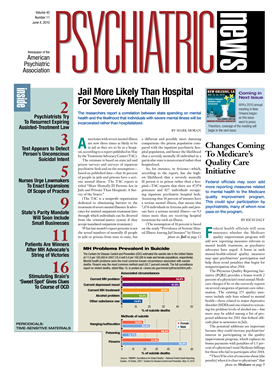A broad coalition of mental health groups in New York, including the New York State Psychiatric Association (NYSPA), is calling for extension of Kendra's Law, the 1999 state law that allows court-ordered assisted outpatient treatment (AOT) for people with severe mental illness who have been repeatedly arrested.
The law was due to expire at the end of this month after a five-year extension granted by the state legislature in 2005.
At press time the fate of the law was unclear in the state legislature, which is grappling with passing a budget for the fiscally strapped state. There are bills in the legislature to make the law permanent, while one proposed by the New York State Office of Mental Health (OMH) would extend it for another five years to 2015.
The latter proposal has received the support of some 21 state mental health organizations including the NYSPA. Other organizations in the coalition calling for the extension are the Coalition of Behavioral Health Agencies, Greater New York Hospital Association, Mental Health Association of New York State, New York Association of Psychiatric Rehabilitation Services, New York State Council for Community Behavioral Healthcare, and New York State Rehabilitation Association.
The 2005 extension was granted with the proviso that a study be undertaken to determine the law's effectiveness and to address some issues, including charges that the law was unevenly applied across the state and that there were racial disparities in the way it was being applied. The OMH awarded a contract to undertake the study to the Services Effectiveness Research Program at the Department of Psychiatry and Behavioral Sciences at Duke University Medical Center.
The report, “The New York State Assisted Outpatient Treatment Program Evaluation,” was published in June 2009 (Psychiatric News, August 21, 2009).
The report did confirm significant variation in application of the law, with more than 70 percent of AOT cases occurring in New York City, while in some upstate counties AOT was used rarely or not at all. Regarding the overrepresentation of African Americans receiving AOT orders, the researchers stated that it is “a function of African Americans' higher likelihood of being poor, higher likelihood of being uninsured, higher likelihood of being treated by the public mental health system,... and higher likelihood of having a history of psychiatric hospitalization.”
The report added, “Whether this overrepresentation is discriminatory rests, in part, on whether AOT is generally seen as beneficial or detrimental to recipients.”
The Duke report found that sustained improvement—as measured by rates of hospitalization, adherence to psychotropic medication regimens, self-harm, harm to others, and homelessness—varied according to the length of time the recipient spent under the AOT order.
“If AOT is discontinued after six months, decreased rates of hospitalization and improved receipt of psychotropic medications are sustained only if recipients continue to receive intensive case-management services,” the report pointed out. “However, if AOT continues for longer than six months, reduced rates of hospitalization and improved receipt of medications are sustained whether or not intensive case-management services are continued after AOT is discontinued. Thus, it appears that improvements are more likely to be sustained if AOT continues for longer than six months.”
The coalition of groups urging the Kendra's Law extension cite the generally beneficial effect AOT has had on patients, while also pointing to deficiencies, including uneven application of the law, disproportionate availability of outpatient services, and uncompensated costs incurred by institutions that provide expertise to the legal system in the course of judicial proceedings.
“While we feel Kendra's Law can be improved to better serve patients and the community, we believe extending the existing law is the proper course of action to assure appropriate outpatient services are available for patients served by Kendra's Law,” said Barry Perlman, M.D., chair of the NYSPA's Committee on Legislation, in a written statement. “Doing so will allow for continued assessment of the law and recommendations to the legislature that are commensurate with evolving research.”
Perlman is a past president of the NYSPA and immediate past vice chair of the APA Council on Advocacy and Government Relations. He is also a past chair of the New York State Mental Health Services Council.
NYSPA Executive Director Seth Stein, J.D., in an interview with Psychiatric News, said, “We have expressed concern about how the [AOT] program works—especially the significant burden of time and cost it places on hospitals and clinics that participate and that are called upon to provide expertise within the legal system. So we have concluded that an extension is appropriate, and we would also support a review of the statute to see what improvements could be made to provide relief for the costs incurred by institutions.”
